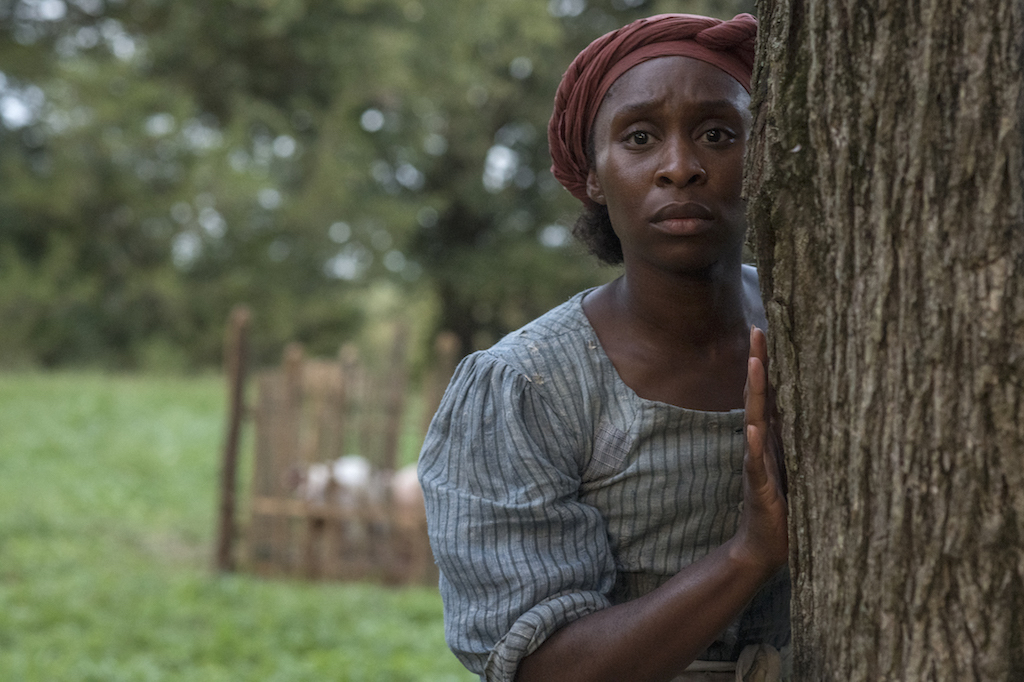
There’s been lots of chatter lately about the relative merits of the superhero movie. I can’t say it’s my favorite genre, but I’ll make an exception for real life superheroes like Harriet Tubman.
To be sure, Kasi Lemmons’ biopic of the legendary Underground Railroad conductor is strictly in a mythologizing mood. But so what? Few Americans deserve the kind of hagiography that Tubman receives here. In some ways, it would be impossible to overstate how brave, important, and singular a figure she was.
When we first meet Harriet (Cynthia Erivo) on a farm in Dorchester County, MD, you don’t see any of this coming. She’s a slave, who goes by the first name of Minty. Her husband (Zackary Momoh) and father (Clarke Peters) are both free men, but their freedom seems precarious. Her mother and siblings are still slaves (a lawyer’s letter demanding that they be released from their bondage, as per a previous arrangement, is unceremoniously ripped up).
Harriet prays for her master’s death—and it comes, the first indication that the film really does see her as a prophet of sorts, bestowed with extraordinary gifts. (The film takes the fact that Harriet can see the future and communicate with God as canon.) But this doesn’t free her. She still has the master’s self-pitying wife and mean-spirited son Gideon (British actor Joe Alwyn, distractingly handsome and dandyish in the role) to contend with. Gideon saw Harriet praying for his father’s death, so he decides to sell her. That’s when she knows she must escape to the north, where black men and women can live free.
This, of course, will prove to be the first of many trips Harriet makes to the north and back—and each plays out like an edge of your seat adventure film, with terrifyingly high stakes. In this first escape, Harriet is being pursued by men on horseback and bloodhounds. When they find her, she’s standing at the precipice of a rapid river. This is when she makes the now famous declaration, “I’m going to be free or die,” and off she jumps.
There are more perils along the way until she makes it to Philadelphia. In a remarkable scene, she finds herself in the center of this bustling city, stunned by the black men and women who are walking free. A friendly stranger tells her to stand tall. There’s nothing to hide from here.
In Philly, she’s introduced to William Still (Leslie Odom Jr.), who has dedicated his life to helping and documenting the stories of slaves. He’s incredulous when he discovers that Harriet has made this journey on her own. It won’t be the last time he underestimates her. William takes Harriet to the boarding house run by the beautiful, uncommonly dignified Marie Buchanan (Janelle Monaé), who immediately comes to admire and love her new charge.
We revisit Harriet a year later and see her as a new woman—no longer meek in any way, but indeed, standing tall and in her power. This is when she decides she must return to Maryland to free her husband and siblings. She gets so good at freeing slaves she becomes a folklore like figure, called Moses. And some slave owners, refusing to believe that they are being outwitted by a black man (they assume she’s a man, of course), speculate that she’s an abolitionist in black face.
I can’t overstate how great Erivo is in this role, as we watch Harriet evolve from a scared (if determined) slave to a free woman whose passionate faith in God and herself inspires a movement. Erivo doesn’t deify Tubman—she can be stubborn, dour, and even bullying—but she depicts her in all her fierceness, righteousness, and glory.
Yes, the film is a straightforward biopic that will certainly be shown in high school history classes for generations to come. I’m fine with that. This kind of American history deserves a film like this. And lest you think the film is exaggerating Harriet Tubman’s bravery and accomplishments, please remember that she was a conductor of the Underground Railroad, the first woman to lead an armed expedition into war, a Union spy, an abolitionist, and a leading supporter of women’s suffrage. If that’s not a superhero, I don’t know who is.
